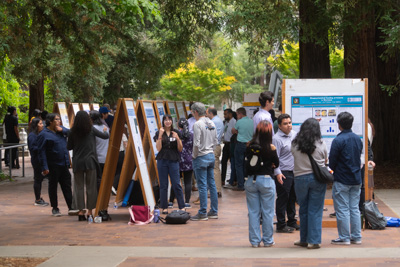Campus News
UC Santa Cruz receives NSF grant to transform diversity and inclusion in STEM graduate programs
The National Science Foundation (NSF) has awarded nearly $1 million to researchers at UC Santa Cruz to advance equity and inclusion by fostering a more inclusive, culturally rich environment in STEM graduate programs.

STEM Diversity Summer Research Symposium on Science Hill on Aug. 28, 2024. (Photo by Nick Gonzales/UC Santa Cruz)
The National Science Foundation (NSF) has awarded nearly $1 million to researchers at UC Santa Cruz to advance equity and inclusion by fostering a more inclusive, culturally rich environment in STEM graduate programs.
Led by Professor of Psychology Su-hua Wang, with Co-PIs Associate Professor of Psychology Rebecca Covarrubias and Professor of Astronomy and Astrophysics Enrico Ramirez-Ruiz, this project is part of a nationwide effort to close gaps in STEM participation and mobilize the scientific innovation and excellence of racially and economically diverse scientists.
In academia, meritocratic structures can often perpetuate inequities by defining merit through criteria that benefit historically privileged groups. This project seeks to address and redefine these structures.
“We’re excited to lead this effort to redefine what it means to succeed in STEM and academia,” said Su-hua Wang, professor of psychology and principal investigator on this project. “By challenging traditional meritocratic frameworks and valuing the unique cultural strengths our students bring, we can create more supportive, empowering environments where every graduate student feels a sense of belonging, finds their voice, and has the opportunity to thrive.”
The NSF-funded project builds on the Community Cultural Wealth model, which values students’ cultural strengths, and the Mobilization of Capital framework, which emphasizes using existing and co-building new resources to foster growth.
Three key programs will be involved in this study: the New Gen Learning Research Consortium, the Eugene Cota-Robles Fellowship program, and the Equity-Minded Mentoring Certificate program. These programs are respectively affiliated with the Institute for Social Transformation, the Division of Graduate Studies, and the Teaching and Learning Center. These initiatives will undergo redesign to further elevate their ability to harness students’ cultural strengths and support meaningful, long-term cultural change within STEM graduate education.
This project utilizes a unique four-stage approach to redesign institutional support for marginalized doctoral students, grounded in evidence-based practices.
- Stage 1 will involve gathering baseline data on the programs to assess their current strengths and areas for improvement, with a particular focus on how well they currently mobilize students’ community cultural wealth.
- Stage 2 will focus on building relationships between programs and home departments, encouraging a collaborative dialogue about cultures of support for STEM graduate students. The findings from Stage 1 will be shared with program staff and department contacts, who will then contribute to the redesign of program elements.
- Stage 3 will involve implementing the redesign plans in coordination with institutional leaders and gathering feedback from participants, providing an opportunity to observe the mobilization process in action.
- Stage 4 will evaluate the impacts of these redesigned programs and assess the long-term effects on institutional culture, practices, and support structures.
The research team will use a rigorous multiple case study method design to analyze the mobilization process and examine the effectiveness of program redesigns. As Co-PI Rebecca Covarrubias described, “this design affords a fine-grained look into the transformative power of relationships: how daily exchanges, interactions, and activities among program members serve as the most critical spaces for shifting culture and for recognizing one another’s strengths.”
Findings will be shared through academic publications and presentations, offering valuable insights for other institutions striving to create more inclusive STEM education environments. The team’s efforts to redefine success in graduate education set a powerful example for the STEM community, paving the way toward a more diverse professoriate and future workforce.